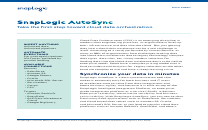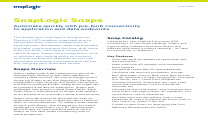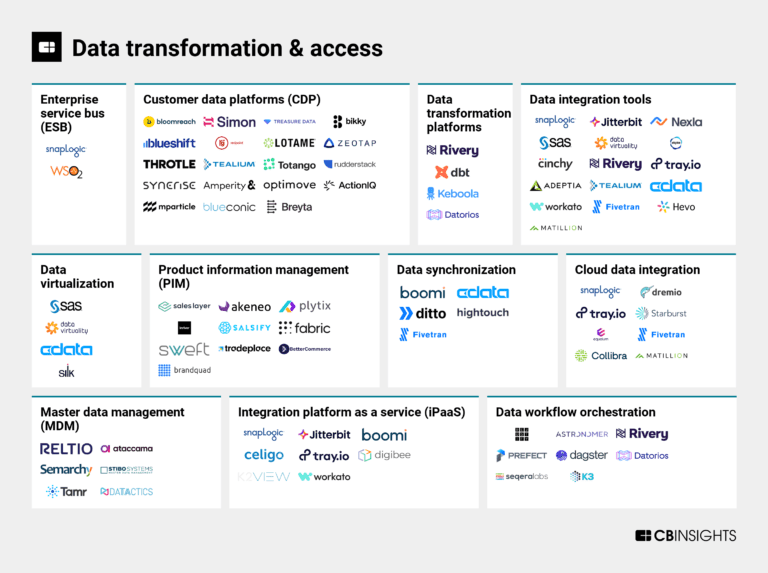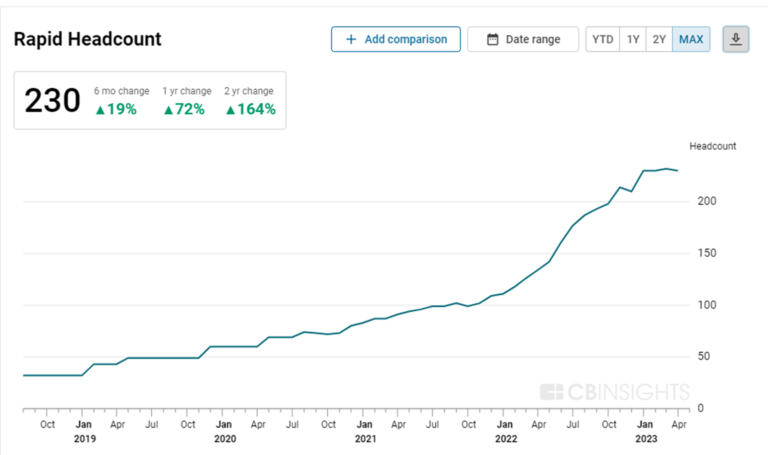
SnapLogic
Founded Year
2006Stage
Series H | AliveTotal Raised
$397.86MValuation
$0000Last Raised
$165M | 3 yrs agoRevenue
$0000Mosaic Score The Mosaic Score is an algorithm that measures the overall financial health and market potential of private companies.
-26 points in the past 30 days
About SnapLogic
SnapLogic provides an integration platform as a service (iPaaS) solution for enterprises specializing in self-service integration. The company provides application integration, data integration, application programming interface (API) management and development, and more. It serves human resources, information technology (IT), sales, finance and accounting, marketing, and other sectors. The company was formerly known as Brown Fox Software. It was founded in 2006 and is based in San Mateo, California.
Loading...
SnapLogic's Product Videos


ESPs containing SnapLogic
The ESP matrix leverages data and analyst insight to identify and rank leading companies in a given technology landscape.
The data integration tools market includes a wide range of solutions that enable the creation of a unified data platform, through the extraction, transformation, and loading (ETL) of data from disparate sources, including legacy systems and modern cloud systems. The market offers alternatives to traditional data architecture, such as hubs and lakes, and provides automated data protection and impro…
SnapLogic named as Outperformer among 15 other companies, including IBM, Microsoft Azure, and Databricks.
SnapLogic's Products & Differentiators
SnapLogic Intelligent iPaaS
Intelligent iPaaS
Loading...
Research containing SnapLogic
Get data-driven expert analysis from the CB Insights Intelligence Unit.
CB Insights Intelligence Analysts have mentioned SnapLogic in 2 CB Insights research briefs, most recently on Aug 4, 2023.

Aug 4, 2023
The data transformation & access market mapExpert Collections containing SnapLogic
Expert Collections are analyst-curated lists that highlight the companies you need to know in the most important technology spaces.
SnapLogic is included in 2 Expert Collections, including Unicorns- Billion Dollar Startups.
Unicorns- Billion Dollar Startups
1,244 items
Tech IPO Pipeline
282 items
Track and capture company information and workflow.
SnapLogic Patents
SnapLogic has filed 1 patent.

Application Date | Grant Date | Title | Related Topics | Status |
|---|---|---|---|---|
9/21/2012 | Data types, Data management, Network protocols, Serial buses, Industrial computing | Application |
Application Date | 9/21/2012 |
|---|---|
Grant Date | |
Title | |
Related Topics | Data types, Data management, Network protocols, Serial buses, Industrial computing |
Status | Application |
Latest SnapLogic News
Sep 15, 2024
Discover the top cloud-based data integration platforms that streamline data management, automate workflows, and enhance decision-making in today's digital landscape. Copied In today's digital landscape, businesses are handling massive amounts of data from various sources. Integrating and managing this data efficiently across multiple systems, applications, and cloud environments is critical to making informed decisions and driving business growth. Cloud-based data integration platforms enable organizations to automate data workflows, synchronize data in real-time, and streamline the overall data management process. As more organizations move to the cloud, these platforms have become essential for improving productivity, scalability, and decision-making. This article covers the top platforms for cloud-based data integration, providing insights into the best solutions for modern businesses to manage and unify their data seamlessly. 1. Informatica Intelligent Cloud Services (IICS) Overview: Informatica is a leading provider of data integration solutions, and its cloud-based platform, Informatica Intelligent Cloud Services (IICS), stands out for its robust capabilities and scalability. IICS offers a comprehensive range of services, including data integration, data quality, and data governance, making it ideal for large enterprises that handle vast amounts of data across cloud and on-premises systems. Key Features: AI-Powered Automation: IICS uses Informatica's AI engine, CLAIRE, to automate data discovery, cleansing, and transformation processes, improving data quality and reducing manual work. Wide Integration Support: Supports hundreds of cloud and on-premise connectors, including AWS, Azure, Google Cloud, and Salesforce, enabling seamless integration across various environments. Real-Time Data Synchronization: Offers real-time data integration and Change Data Capture (CDC) features to ensure data consistency across systems. Scalability: Designed to handle large-scale enterprise workloads, IICS is highly scalable and can easily integrate with complex systems. Why It's Great: Informatica IICS is known for its enterprise-grade security, AI-driven data management, and powerful integration capabilities. It is the go-to solution for large organizations seeking a unified platform for managing complex data environments across multiple cloud services. 2. Microsoft Azure Data Factory Overview: Microsoft Azure Data Factory (ADF) is a fully managed cloud-based data integration service offered by Microsoft. It provides a comprehensive solution for orchestrating data pipelines, enabling users to create, schedule, and monitor data workflows across hybrid and cloud environments. ADF is particularly useful for businesses already using Microsoft's Azure ecosystem. Key Features: ETL and ELT Support: ADF supports both Extract, Transform, Load (ETL) and Extract, Load, transform (ELT) processes, making it versatile for different data workflows. Hybrid Data Integration: Integrates with over 90 on-premises and cloud data sources, including Azure SQL, Azure Data Lake, and Power BI, enabling businesses to connect various data services easily. Visual Data Pipeline Creation: ADF's drag-and-drop interface allows users to create complex data pipelines without extensive coding, improving accessibility for non-technical users. Real-Time Monitoring: Offers real-time monitoring of data pipelines with built-in alerts and notifications for quick issue resolution. Why It's Great: Azure Data Factory is an excellent choice for businesses already integrated into the Azure cloud ecosystem. It provides a flexible, scalable, and reliable solution for automating data integration and processing tasks, making it ideal for cloud-based data warehousing and analytics projects. 3. Talend Cloud Overview: Talend Cloud is a comprehensive cloud-based data integration platform known for its powerful data management and governance capabilities. It supports end-to-end data integration, data quality, and data preparation, making it suitable for businesses looking for a unified solution for managing data in the cloud. Key Features: Unified Data Management: Talend Cloud offers data integration, data quality management, and governance features in a single platform, ensuring data consistency and compliance. Open-Source Flexibility: Talend provides both open-source and enterprise-grade solutions, offering flexibility and scalability based on the organization's needs. Pre-Built Connectors: Talend Cloud has over 1,000 pre-built connectors to cloud and on-premises systems, including AWS, Google Cloud, Salesforce, and Hadoop, ensuring easy integration with existing infrastructure. Real-Time Data Processing: Supports real-time data integration and transformation, allowing organizations to process streaming data from IoT devices, sensors, and social media platforms. Why It's Great: Talend Cloud is known for its focus on data quality and governance, making it a great solution for businesses that need to ensure data accuracy and compliance. Its open-source roots also provide flexibility for organizations looking for customizable data integration solutions. 4. Dell Boomi Overview: Dell Boomi is a cloud-native integration platform that specializes in data, application, and B2B integration. Its user-friendly interface and low-code development environment make it ideal for businesses seeking to automate data workflows quickly and efficiently. Key Features: Low-Code Platform: Boomi offers a drag-and-drop interface that allows users to create integrations without requiring extensive programming knowledge, making it accessible to non-developers. Pre-Built Connectors: Boomi comes with a wide range of pre-built connectors for cloud applications like Salesforce, NetSuite, and Workday, as well as on-premises databases and ERP systems. Real-Time Integration: Supports real-time data integration and sync, enabling businesses to keep their systems up to date with the latest information. B2B Integration: Dell Boomi excels in integrating B2B workflows, making it easy to connect with external partners and manage supply chain operations. Why It's Great: Dell Boomi is perfect for businesses looking to automate integrations across various systems with minimal development effort. Its low-code approach, combined with extensive pre-built connectors, allows businesses to quickly implement and scale data integration solutions. 5. MuleSoft Anypoint Platform Overview: MuleSoft's Anypoint Platform is a leading API-led integration solution, providing businesses with tools to connect applications, data, and devices across on-premises and cloud environments. It excels in building reusable APIs, making it a preferred choice for organizations focused on API-driven architecture. Key Features: API-Led Connectivity: MuleSoft Anypoint Platform emphasizes API-led connectivity, allowing businesses to build reusable APIs that can be leveraged across different applications. Comprehensive Integration: Offers a wide range of connectors for integrating with cloud services, legacy systems, databases, and IoT devices. Scalability and Performance: Designed to handle large-scale enterprise applications, MuleSoft provides high-performance capabilities for integrating large volumes of data in real-time. Built-In Security and Governance: MuleSoft offers strong security features, including data encryption, API policies, and access controls, ensuring secure data transfer between systems. Why It's Great: MuleSoft Anypoint Platform is ideal for enterprises that prioritize an API-first approach to integration. Its focus on building reusable APIs and scalable integrations makes it a great choice for companies looking to modernize their IT infrastructure and improve agility. 6. SnapLogic Overview: SnapLogic is a cloud-based integration platform that uses artificial intelligence to automate data and application integration. Its self-service interface allows business users to connect systems quickly, reducing reliance on IT teams for routine integration tasks. Key Features: AI-Driven Automation: SnapLogic uses AI and machine learning to recommend integration paths, automate workflows, and optimize performance, reducing manual intervention. Hybrid Cloud Integration: Supports both cloud and on-premises integrations, allowing businesses to connect applications and data sources across hybrid environments. Low-Code Development: The platform's intuitive low-code interface enables users to create integrations without extensive coding, improving efficiency and accessibility. Elastic Scalability: SnapLogic is built for enterprise scalability, allowing organizations to manage large data sets and complex integrations effortlessly. Why It's Great: SnapLogic's AI-driven approach to data integration simplifies the process for both technical and non-technical users. Its self-service model and scalability make it an excellent choice for organizations looking to democratize data integration and improve operational efficiency. Conclusion Cloud-based data integration platforms are critical tools for modern businesses to manage and unify their data across various systems and applications. The platforms mentioned in this article—Informatica IICS, Azure Data Factory, Talend Cloud, Dell Boomi, MuleSoft Anypoint Platform, and SnapLogic—are some of the bests in the industry, offering diverse capabilities to suit different business needs.
SnapLogic Frequently Asked Questions (FAQ)
When was SnapLogic founded?
SnapLogic was founded in 2006.
Where is SnapLogic's headquarters?
SnapLogic's headquarters is located at 1825 South Grant Street, San Mateo.
What is SnapLogic's latest funding round?
SnapLogic's latest funding round is Series H.
How much did SnapLogic raise?
SnapLogic raised a total of $397.86M.
Who are the investors of SnapLogic?
Investors of SnapLogic include Sixth Street Growth, Arrowroot Capital, Golub Capital, Andreessen Horowitz, Ignition Partners and 15 more.
Who are SnapLogic's competitors?
Competitors of SnapLogic include Digibee, Adeptia, Workato, Conektto, Tray and 7 more.
What products does SnapLogic offer?
SnapLogic's products include SnapLogic Intelligent iPaaS.
Who are SnapLogic's customers?
Customers of SnapLogic include Adobe, Box, WD-40, aramark and Bristol Meyers Squib.
Loading...
Compare SnapLogic to Competitors

Boomi focuses on providing intelligent connectivity and automation solutions within the integration platform as a service (iPaaS) industry. The company offers a suite of services including application and data integration, API management, and master data synchronization to facilitate digital transformation for businesses. Boomi primarily serves sectors such as healthcare, life sciences, manufacturing, financial services, retail, public sector, and higher education. It was founded in 2000 and is based in Conshohocken, Pennsylvania.

Jitterbit is a company focused on providing data integration solutions and low-code application development within the technology sector. Its main offerings include a platform for connecting systems, automating workflows, and creating applications with a low-code approach. Jitterbit's products and services are designed to facilitate seamless integration and automation for businesses across various industries. It was founded in 2004 and is based in Alameda, California.

WSO2 specializes in digital transformation and management software within the technology sector. The company offers a suite of tools for API management, integration, and identity & access management, designed to help enterprises create and deliver digital experiences. Its products are available as open source solutions, enterprise-grade SaaS, and private cloud deployments, catering to a variety of customer needs in building and managing digital platforms. It was founded in 2005 and is based in Santa Clara, California.

Celigo is a company that focuses on integration and automation, operating within the technology industry. The company offers a platform that connects applications and automates processes, enabling both IT and business teams to streamline common and custom business operations. Celigo primarily serves sectors such as IT, finance, ecommerce, SaaS/Software, and human resources. It was founded in 2005 and is based in San Mateo, California.

Workato specializes in artificial intelligence (AI) powered enterprise automation. The company offers a platform that enables businesses to automate their processes by integrating their applications, data, and experiences, all in a low-code, no-code environment, primarily serving sectors such as information technology, human resources, sales, marketing, finance, and support. It was founded in 2013 and is based in Mountain View, California.
Youredi is a company that focuses on data integration services and connectivity solutions, primarily operating in the supply chain and logistics industry. The company offers a range of services including the provision of fully managed data integration services and solutions that streamline customer processes through B2B integrations. These services are primarily targeted towards logistics technology companies, shippers or receivers of goods, logistics service providers, and carriers. It is based in Espoo, Finland.
Loading...
